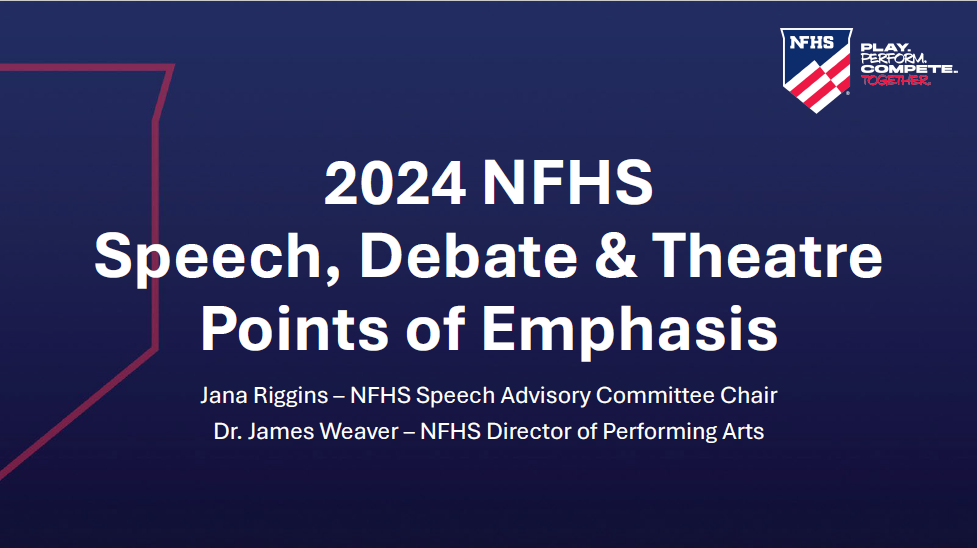Artificial Intelligence (AI) Integration in High School Theatre
By NFHS on February 23, 2024 Speech Debate & Theatre Directors PrintPotential positives of integrating AI into high school theatre programs include:
- Enhanced Creative Processes: AI can aid students and theatre directors in script analysis, set design, and lighting and sound design. For actors, AI can assist in script analysis and character development.
- Educational Opportunities: Students have the potential to learn about the intersection of technology and the arts, gaining valuable skills in AI and its applications.
- Promotion of Equity: AI tools could help in casting and script selection, thus promoting diverse and inclusive representation in theatre productions.
- Privacy and Ethical Considerations: The use of AI in theatre will necessitate careful consideration of copyright, privacy and ethical issues, particularly in the handling of student data and intellectual property.
Overall, the integration of AI could significantly enrich high school theatre programs, fostering innovation and inclusivity, while also presenting new challenges and learning opportunities.
Potential negative impacts of integrating AI into high school theatre programs include:
- Resource Disparity: Some schools might not have sufficient resources to access advanced AI tools, potentially widening the gap between well-funded and less-resourced programs.
- Overdependence on Technology: A risk exists that heavy reliance on AI could undermine the development of traditional theatrical skills and individual creativity.
- Resource Challenges: Schools might face challenges in accessing and implementing AI tools due to varying resources.
- Privacy Concerns: The use of AI in educational settings can raise questions about the security and confidentiality of student data.
- Ethical and Intellectual Property Issues: The use of AI in creative processes could lead to challenges regarding originality and the ethical use of AI-generated content, particularly in relation to alleged public domain works.
- Bias in AI Tools: AI tools might inadvertently perpetuate biases in casting or script selection, contrary to the goals of inclusivity and diversity.
Addressing these concerns will be crucial for the successful and responsible integration of AI into high school theatre programs.
Policy Guidance for State Associations: Utilizing AI in High School Theatre Programs
Reference: President Biden's Executive Order on AI
Purpose: This guidance aims to assist state associations in incorporating AI technologies into high school theatre programs, considering the principles of the Executive Order on AI and the nuances of public domain works.
Key Principles:
- Ethical Use of AI: Employ AI tools that are ethically designed and do not infringe on intellectual property rights, especially in the context of public domain works used in theatre productions.
- Enhancing Creativity, Not Replacing It: Use AI as a tool to augment the creative process in theatre, such as in set design or script analysis, while maintaining the integrity of human creativity and interpretation.
- Education and Training in AI: Include education on AI's role in the arts within theatre curricula, focusing on how AI can be used responsibly and creatively in theatrical productions while following copyright law.
- Equity and Inclusivity: Utilize AI tools to inhibit biases or exclusivity in casting, scripting, and production. Strive to use AI in ways that promote and enhance diversity and inclusivity in theatre.
- Data Privacy and Security: Be vigilant about protecting personal data, particularly in digital platforms used for rehearsals, performances, and script-writing.
- Accessibility and Resource Management: Provide equitable access to AI tools across different schools, addressing the resource gap and ensuring all students may benefit from AI in theatre.
Implementation and Monitoring: Regular training sessions should be organized for educators and students on the use of AI in theatre. Monitor the content of such sessions so that it aligns with these principles and enhance the educational experience.
Conclusion: Through the responsible and creative use of AI, high school theatre programs can explore new dimensions in performance and production, while adhering to the values of creativity, equity, privacy, and respect for intellectual property.




